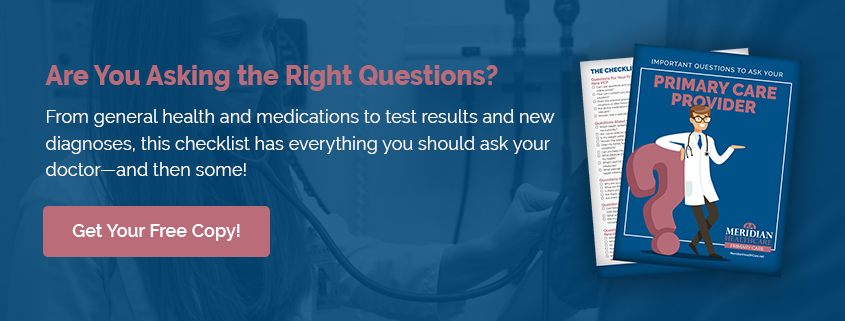How to Choose a Primary Care Physician
Primary care physicians (PCPs) are the foundation of the U.S. healthcare system, serving as the entry point to all other health care services, including specialists and hospitals. (Over 200 million visits to PCPs occur in the United States every year!)
In most cases, people visit their PCPs more than any other medical professional, which makes it important to choose a doctor you feel comfortable with. Why? Because research shows that patients who have strong relationships with their PCPs (aka patient-centered care) have better outcomes!
When choosing a primary care physician, there are many factors to take into consideration, from office hours and staff competency to insurance coverage and office environment. Before you schedule with a new office, keep these eight things in mind when choosing a primary care provider for yourself or for a loved one.
1 – Understand Your Medical History
First, assess your needs.
Are you looking for a primary care provider who can do routine annual check-ups and preventive care? Do you have health issues or a chronic condition that must be managed? Do you need specialty care or regular screenings? There are many reasons for seeing a doctor, and it’s important that your doctor knows exactly what’s going on.
Make a list of what your specific health care concerns so that when you’re ready to pay a visit to the primary care doctor that you’ve chosen, he or she will be fully aware of your needs and expectations.
2 – Talk to Family and Friends
Once you know what your needs are, choose a doctor who can meet them. Often, the people closest to you — family members, friends and neighbors — are the best source of information on finding a new doctor. They can tell you about the doctors they use and why they like them.
Ask questions about the cleanliness of the office, the attentiveness of the office staff, and the doctor’s attitude and demeanor. Keep in mind, however, that everyone is different. One person’s good experience at a doctor’s office may not necessarily translate into your good experience.
Also ask for recommendations from other types of doctors. Other health professionals you trust – pharmacists, dentists, or physical therapists – can have helpful information about doctors in your local area.
3 – Types of Primary Care Doctor
Primary care doctors practice in slightly different areas of medicine and patient care. Types of PCPs include:
Family Practice Doctors
Family practice doctors, also known as family medicine doctors, specialize in the comprehensive care of people of all ages. They diagnose and treat a wide range of conditions, including many chronic diseases.
Family doctors may also provide preventive care, including routine checkups, health-risk assessments, immunizations or vaccinations, screening tests, and personalized counseling on maintaining a healthy lifestyle.
General Internal Medicine Doctors
Internal medicine physicians, or internists, are specialists who apply scientific knowledge and clinical expertise to the diagnosis, treatment, and compassionate care of adults across the spectrum from health to complex illness. Internists do not treat patients of all ages, only those over the age of eighteen. If you have a condition that is beyond their scope, they will arrange for a referral to a specialist.
Pediatricians
Pediatricians are medical doctors who specialize in treating children from birth through the age of eighteen. They specialize in diagnosing and treating conditions in all ages of children, from infants to adolescents.
Nurse Practitioners (NPs)/Physician Assistants (PAs)
Nurse practitioners are advanced practice registered nurses (APRNs) who provide high-quality health care services similar to those of physicians. In certain states, they can prescribe medications and perform procedures just like physicians do.
Similarly, a physician assistant is a licensed clinician who works in collaboration with the practice physician to diagnose and treat illnesses, develop treatment plans, prescribe medications, make rounds and more.
Obstetrician/Gynecologists (OB/GYNs)
OB/GYNs provide medical care related to pregnancy or reproductive health, including prenatal care, delivery, postpartum care, gynecological exams and treatment of disorders of the female reproductive system.
Geriatricians
Geriatricians specialize in the care and wellness of elderly patients. Older adults frequently suffer from chronic conditions, such as high blood pressure and diabetes. Most older adults have more than one chronic condition, consequently making their health needs different from younger patients.
4 – Review Your Insurance Coverage
The first step to take when choosing a doctor is to find out if the doctors you are considering are covered by your health insurance plan. If you have insurance, check with your insurance company by calling the number on the back of your card. Ask what doctors are covered on your policy and get a list of in-network providers.
If you don’t have insurance, look for a doctor who participates on a sliding scale basis for fees. Sliding scale fees are usually offered by community health centers and local hospitals.
You can also search for doctors who accept Medicaid and Medicare. To find these doctors, visit medicare.gov and healthcare.gov.
5 – Distance
Some of the most common reasons for choosing a doctor include convenience and location. In an effort to make appointments easier, many patients opt for physicians who are close to home or work. However, it may be worth considering all other options before making this choice.
Convenience shouldn’t be the only factor when considering your new primary care physician, but if a doctor is too far away, it’s less likely that you will visit your PCP as often as you should. A recent study suggests that there is an association between poorer health outcomes and the greater the distance a patient lives from his or her primary healthcare facility.
6 – Do You Have Other Special Requirements?
Finding a healthcare provider that you’re comfortable with is a decision that isn’t based solely on your medical needs alone. We are all different, and the cumulative effect of our life experiences and medical conditions affect the way in which we interact with physicians. Think about any special non-medical needs that you may have.
Perhaps English isn’t your first language. Are you more comfortable communicating with your doctor in a language other than English? You can search for doctors who are bilingual or have translation services on-site.
7 – Make an Appointment
Assuming you’ve done all of the previous research, the best thing you can do to tell if a doctor will be right for your health care needs is to call their office and set up your first appointment.
A face-to-face meeting with a new doctor is the best way to get to know them.
When you call your chosen doctor’s office, you’ll also be able to evaluate the friendliness and attentiveness of the staff and see how busy the practice is. Are they taking new patients right away, or will you have to wait for weeks (or possibly months) to see the doctor?
Be sure to ask about their credentials, training and experience, as well as about the types of patients they see most often. Above all else, keep in mind that you’re under no obligation to choose them as your PCP.
8 – Trust Your Instincts
In the end, it’s up to you to evaluate all the evidence to determine if a doctor should be your PCP. After your first appointment, evaluate the visit.
Did the doctor take the time to answer all your questions thoroughly, in a way that was easy to understand? Did you feel comfortable interacting with this doctor? How was your interaction with the office staff? Was the appointment process straightforward?
Go with your gut feeling. If you’ve done diligent research, then you should have a list of PCP candidates to choose from before you even make the first call.
Make a Well-Informed Choice
Choosing a primary care physician is one of the most important, yet most difficult, choices you’ll make during your adult life. With so much riding on this decision — personal health, financial considerations — it pays to do the research in order to choose the right doctor.
Of course, no single piece of advice or information can stand in place of a face-to-face meeting with a doctor. But with this advice as a starting point, you can get off to a great start with your new primary care physician.
If you’re looking for primary care or family physician, the medical team at Meridian HealthCare is here for you and your family. Our team consists of our chief medical officer, physicians, nurse practitioners, licensed practical nurses, and a full medical support staff. We’re ready to be your partners in health.






